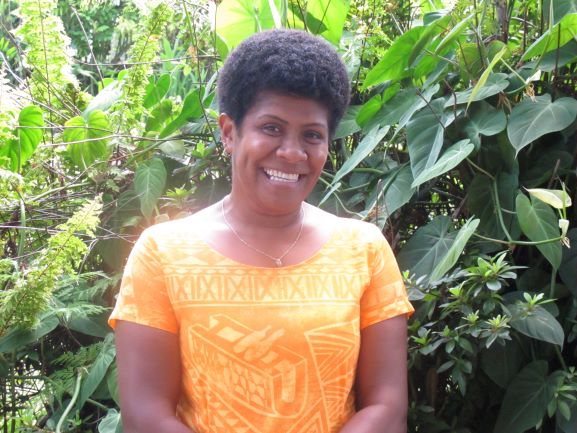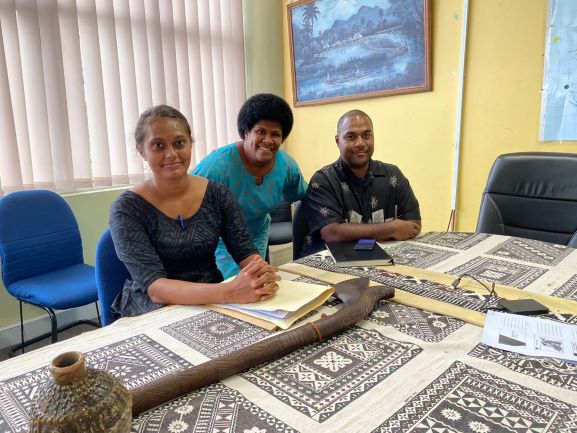Akanisi (known to many as Cagi) was born in Vanuatu. At the age of 13, she came to Fiji with her family and since then lived a life of a Fiji urbanite. Akanisi’s passion for working with Fijian communities developed when she first went to a village in 2002, as a community engagement officer. She noticed how the villagers lived a worriless life away from the urban rush and race for time and money.

Wildlife Conservation Society, Community Engagement Coordinator, Akanisi Caginitoba ©WCS
“In the village, if there are no sugar and tea leaves, people can improvise with the natural resources they are surrounded with,” says Akanisi. “They cook cassava and dalo (taro) and have it with the water they boiled it with, making it their breakfast. Fresh fruits between meals serve as snack or dessert,” she added.
Akanisi’s passion to learn more about Fijian culture and traditions from different communities has brought her closer to them. “I like listening to old stories that they have. For instance, how Bua got its name? How people settled there and how times have changed for them? Given the increase in the demand for money, I have also heard about how people are trying to look for new ways to make money which is having other consequences like risking the loss of their resources or forgetting traditional skills such as weaving mats and baskets.”
She explains, “I know that through the various projects supported by the Wildlife Conservation Society (WCS) on natural resource management and livelihoods, I am able to weave and foster the traditional skillsets of the community members back into their daily lives, and help them do what they have been doing right – protecting their valuable culture and heritage and resources for their children and Fiji’s future.

Akanisi with Wildlife Conservation Society staff during a meeting. ©Eferemo Kubunavanua
The community life captivated Akanisi and prompted her to specialize in community engagement. Her role as a WCS Community Engagement Coordinator provides visionary leadership, and assists communities to identify, design and raise funds for their projects. Through the research and data collected by WCS’s scientists, Akanisi helps communities understand the health of their surrounding natural resources. She works with them to create bottom-up community-based resource management plans that integrates the traditional ecological knowledge and science. These plans not only protect the resources such as fisheries and forests but also offer sustainable economic benefits to communities.
Akanisi has been with WCS for over two decades working throughout the 14 provinces of Fiji in over 120 villages, each with different cultural and traditional backgrounds. She has helped nine districts develop ecosystem-based management (EBM) plans, and is currently developing pathways and approaches to integrate disaster risk reduction into community planning processes. She has also worked with communities, mainly women to establish their alternative livelihood projects which included: virgin coconut oil, honey and ‘kuta’ mats.
1. What has been one of the greatest highlights of your career so far? Our team has successfully worked with all nine districts of Bua Province to implement their EBM plans. Last year, we launched the Koro Island EBM plan, the first ever island-scale EBM plan for Fiji. These are integrated approaches to managing community/island resources sustainably. I am forever grateful for the excellent support I received from the district and island hierarchy committee members, which has made the development of this plan possible. The leaders and people of Koro are happy with the plan because this will enable their food security and ensure a sustainable income for them and their future generation.
2. Why are you passionate about community engagement?
I am very passionate about my work because I get to visit new places in Fiji especially in the areas that we work in. With the kind of work that I do I get to interact with different people and I am always ready to bring a change and give them hope for a brighter future, if they look after their ecosystem well. With this role I am able to facilitate changes, assist address issues, support the resource management committees and provide information or resources they might need through projects they are conducting within their villages or districts.
3. What message do you have for young men and women who wish to work with communities? Working with communities is inspirational. One gets to learn a lot of new things every day, especially the amazing culture and traditions within in the different provinces of Fiji. If you have the passion for learning, and have the patience and humbleness within you, then working with communities to find the right tool to understand and address their issues will be fun and fulfilling.